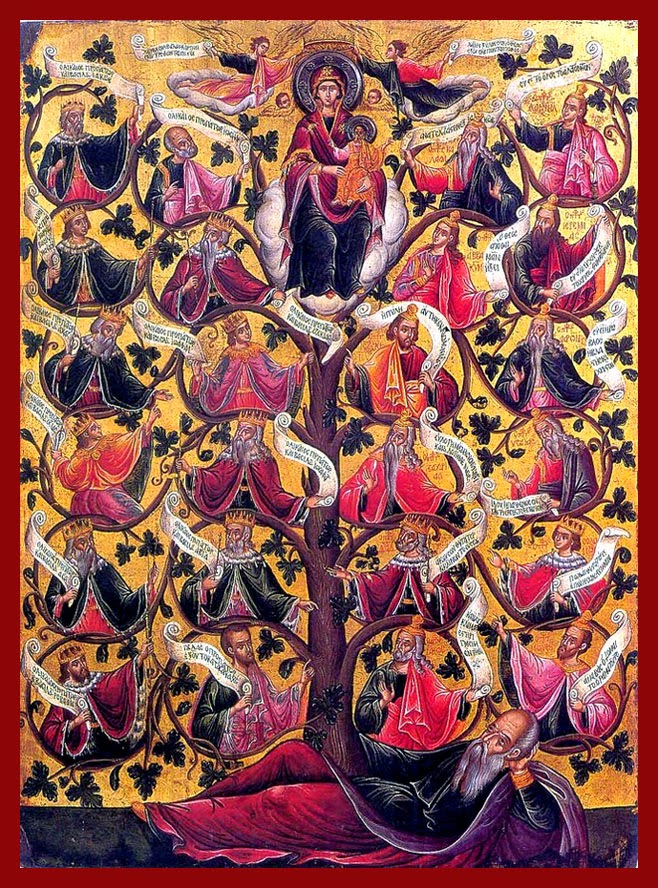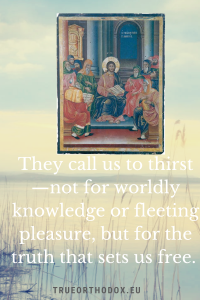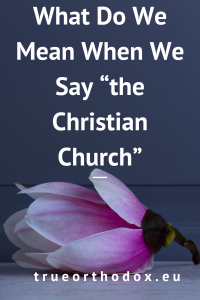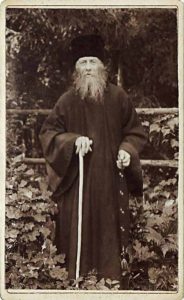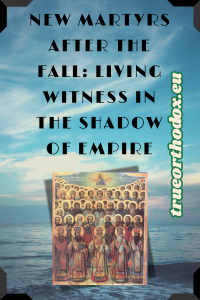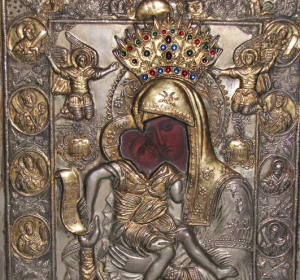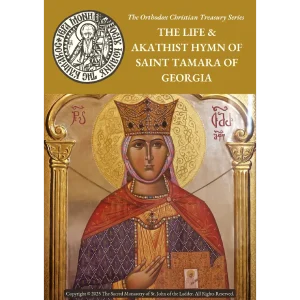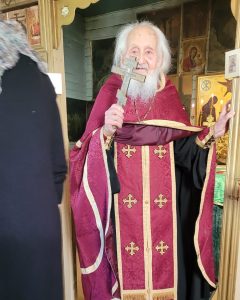SERMON ON THE SUNDAY OF THE HOLY FATHERS (UNOFFICIAL TRANSLATION & ОРИГИНАЛЬНЫЙ РУССКИЙ)
SERMON ON THE SUNDAY OF THE HOLY FATHERS (THE SUNDAY BEFORE NATIVITY)
BY HIS EMINENCE ARCHBISHOP TIKHON
FIRST HIERARCH OF THE RUSSIAN TRUE ORTHODOX CHURCH
2022, Omsk, Siberia
The book of the generation of Jesus Christ, the Son of David, the Son of Abraham.
Abraham begat Isaac, and Isaac begat Jacob, and Jacob begat Judas and his brethren, and Judas begat Phares and Zara of Thamar, and Phares begat Esrom, and Esrom begat Aram, and Aram begat Aminadab, and Aminadab begat Naasson, and Naasson begat Salmon, and Salmon begat Booz of Rachab, and Booz begat Obed of Ruth, and Obed begat Jesse, and Jesse begat David the king. And David the king begat Solomon of her who had been the wife of Urias, and Solomon begat Roboam, and Roboam begat Abia, and Abia begat Asa, and Asa begat Josaphat, and Josaphat begat Joram, and Joram begat Ozias, and Ozias begat Joatham, and Joatham begat Achaz, and Achaz begat Ezekias, and Ezekias begat Manasses, and Manasses begat Amon, and Amon begat Josias, and Josias begat Jechonias and his brethren, in the time of the deportation to Babylon. And after the deportation to Babylon, Jechonias begat Salathiel, and Salathiel begat Zorobabel, and Zorobabel begat Abiud, and Abiud begat Eliakeim, and Eliakeim begat Azor, and Azor begat Sadok, and Sadok begat Acheim, and Acheim begat Eliud, and Eliud begat Eleazar, and Eleazar begat Matthan, and Matthan begat Jacob, and Jacob begat Joseph the husband of Mary, of whom was born Jesus Who is called Christ.
Then all the generations from Abraham until David are fourteen generations, and from David until the deportation to Babylon are fourteen generations, and from the deportation to Babylon until the Christ are fourteen generations.
Now the birth of Jesus Christ was thus: For His Mother, Mary, having been betrothed to Joseph, before they came together, was found to be with child of the Holy Spirit. But Joseph her husband, being just, and yet not willing to make her an example, wished to divorce her secretly. And after he pondered these things, behold, an angel of the Lord appeared to him in a dream, saying, “Joseph, son of David, do not become afraid to take to thee Mariam thy wife; for that which is in her was begotten of the Holy Spirit. And she shall bring forth a Son and thou shalt call His name Jesus, for He shall save His people from their sins. Now all this came to pass, in order that it might be fulfilled that which was spoken by the Lord through the prophet, saying, ‘Behold, the virgin shall be with child, and shall bring forth a son, and they shall call His name Emmanuel,’” which is, being interpreted, “God with us.” And Joseph, having been awakened from sleep, did as the angel of the Lord commanded him, and took to him his wife, and was not knowing her until she brought forth her Son, the firstborn; and he called His name Jesus. (Mt. 1:1-25).
In the name of the Father, and of the Son, and of the Holy Spirit.
Just before the feast of the Nativity of Christ, on this Sunday, which is called the Sunday of the Holy Fathers, our Church offers us a narrative about the ancestors of our Savior according to the flesh. The Book of the Generation of Jesus Christ… – this is how today’s Gospel begins.
From it we learn that our Savior is of the lineage of David and Abraham, as the prophets foretold by inspiration from the Lord. He is the very Messiah, Christ the Redeemer, Whom people had been waiting for for thousands of years, suffering under the burden of sin, remaining in rejection from God, being doomed through sin to spiritual death. He is the very Messiah, whom the Jews had every opportunity to recognize, for the writings of the Prophets so clearly indicated His very lineage, origin and place of birth – the city and time of His appearance in the world. Therefore, all those who had an ardent desire to know the whole will of God about the salvation of men, who had obedience to the word of God and the instructions of the holy Prophets – all those chosen sons of ancient Israel could recognise and, indeed, did recognise the coming Saviour, rejoiced at His appearance, listened to His word, followed Him, entered His Church and showed others the way to heaven, to eternity and salvation.
This is what the genealogy of Jesus Christ, about which St. Matthew the Evangelist speaks, reminds us of. For us, this book of the generation of Jesus Christ is a spiritualised and living teaching, the meaning of which lies in the fact that our Lord Jesus Christ, the Eternal, Incomprehensible God entered into kinship with us – sinful people, and now we are relatives, loved ones, God’s own! What a great and wonderful relationship you and I have! Can one imagine such joy as when, through His Only Begotten, Incarnate Son, God entered into kinship with sinful humanity?
Prior to this, for five thousand years, suffering and tormented by the violence of the devil, humanity languished in anticipation of the promised Saviour. Even at the dawn of mankind, in Paradise, Adam and Eve sinned before God and thereby removed themselves from His countenance. Then, their descendants also sinned and repented, and sinned again. They aspired with all their soul and conscience to God, they sought communion and intimacy with Him, but the oath to which humanity was subjected in the person of the forefathers did not allow them to come closer, to approach Him. It was necessary that God Himself come and approach men, to become incarnate and live among them and free them from their oath. And now, the time has come to fulfill what was foreordained in the eternal Sobete of the Holy Trinity. In His inexpressible love, God sends His Only Begotten Son to man, and through Him, through His incarnation, He enters into such close communion with men that this communion becomes a relationship between God and men, and men with God. According to the words of the Apostle, which he spoke to Christians: “Ye are no longer strangers and sojourners, but fellow citizens of the saints and of the household of God.” That’s how great this relationship is!
However, to whom more is given, more will be required. Therefore, we, who have been honored with kinship with God, must cherish it – cherish it, preserving the dignity of Orthodox Christians. We, as relatives and friends of God, living in the world in these apocalyptic times, must have reasonable caution in ourselves, we must cultivate special attention to ourselves, to our thoughts and movements of the heart, to our words and actions – to our whole life, which in the patristic tradition is called sobriety [trezveniyem]. Human life is too short to squander not only hours and days, but whole years. And we should not waste our lives on worldly pleasures that lure us into the whirlpool of passions. A friend of the world is an enemy of God, according to the words of the Apostle John the Theologian, and we must conceive a hatred of the world. But it may be asked: “Did Christ take on flesh to preach hatred, did He speak of hatred for anything?”
We open the Gospel and read: “If anyone come to Me, and hate not his own father, and mother, and wife, and children, and brothers, and sisters, and still, his own life also, he cannot be My disciple” (Luke 14:26). That’s what the Lord said. Did He talk about [personal] hatred for his father, mother, wife, children, brothers, sisters? No, He spoke about the hatred of our worldly relations with brothers and sisters, about the hatred of the worldly attitude towards our very life. But this word “hate” – it was uttered by the Savior, and it was later repeated many times by His holy disciples, who teach “to hate sin.” To “hate the world” does not at all mean to hate people, it does not at all mean to hate nature and life itself, but it does mean to hate the world that “lies in evil.”
To “hate the world” means to hate that which makes a person live not for eternity, not for salvation. “Hating the world” means hating its temptations that make a person forget the highest meaning of his being, forget the Lord, forget prayer, forget those higher joys that are revealed to a person of faith, and instead of all this give in to worldly pleasure, this fun that poisons the heart with mortal anguish. “To hate the world” means to hate those passions that deprive the deified person of the highest dignity, forcing him to become “more woeful than cattle.” “Hating the world” does not mean hating what the Creator created for good, but it means hating that which turns good into evil and death, it means hating the worldly deceit that draws gullible and weak people into the abyss of death.
If we, being carried away by worldly vanity and indulging our passions, have taken the path of sin, have disgraced our kinship with God, have imputed it to nothing, if we have given ourselves to the enemy of God and our salvation – the devil, have gone over to his side, then we face a burning shame, severe reproaches of conscience, and as a result – a heavy torment of soul. Not only that, but an eternal alienation follows, i.e. an endless estrangement from our Creator. This will be the most unbearable eternal torment.
Let us remember that it did not only take the incarnation of Jesus Christ to deliver sinful men from sin and evil, from eternal death, to make them kindred of God; it took His indescribable sufferings of the Spirit and His pure body, it took the blood of the Son of God and His death.
Will we still knowingly crucify Him again and again with our sins? Let us be ashamed of this, and let us not delay in repenting of our sins, not forgetting the worthy fruits of repentance, for all will be exacted, all will be answered [for] at the Final Judgement of Christ.
Let us remember that kinship with God in itself, without our aspirations and efforts to be worthy of this kinship, will not save us in the eyes of the Merciful – but also Righteous – Judge. Let us strive, with our best labours and deeds, to be worthy that the Book of our kinship with God may be for us the Book of our salvation, and not of our condemnation.
As we prepare to meet the great feast of Nativity, let us also take care that we are not ignorant of our faith, of the teachings of the Holy Church, but let us try to familiarise ourselves with all that the Church teaches us, so that we can defend our faith and explain it to anyone who asks about it. And then, when we are so devoted to the Lord and, above all, put His holy teaching and obedience to His holy law at the centre, then we will be able to meet Him as we should, to worship Him and offer Him the gifts He desires: Christian faith, hope and love!
AMEN.
++++++++++++
НЕДЕЛЯ СВЯТЫХ ОТЦЕВ (ОНА ЖЕ – НЕДЕЛЯ ПЕРЕД РОЖДЕСТВОМ)
Во имя Отца и Сына и Святаго Духа.
Перед самым праздником Рождества Христова, в нынешнее воскресенье, которое носит название Недели Святых Отцов, наша Церковь предлагает нам повествование о предках нашего Спасителя по плоти. Книга родства Иисуса Христа… – так начинается сегодняшнее Евангелие.
Из него мы узнаем, что Спаситель наш из рода Давидова и Авраамова, как об этом предсказывали пророки по вдохновению от Господа. Он – Тот Самый Мессия, Христос Избавитель, Которого ожидали люди в течение тысячелетий, страдая под бременем греха, пребывая в отвержении от Бога, будучи обреченными через грех на духовную смерть. Он – Тот Самый Мессия, узнать которого евреи имели полную возможность, ибо писания пророков так ясно указали самый род Его, происхождение и место рождения – город и время явления Его в мiр. Поэтому, все те, у кого было горячее желание узнать всю волю Божию о спасении людей, у кого было послушание слову Божию и указанию святых пророков – все те избранные сыны древнего Израиля могли узнать и, действительно, узнали пришедшего Спасителя, радовались Его явлению, слушали Его слово, пошли за Ним, вошли в Его Церковь и показали другим путь к небу, к вечности и спасению.
Вот о чем напоминает нам родословие Иисуса Христа, о котором говорит св.евангелист Матфей. Для нас эта книга родства Иисуса Христа являет собою одухотворенное и живое поучение, смысл которого заключается в том, что Господь наш Иисус Христос, Вечный, Непостижимый Бог вступил в родство – с нами, грешными людьми, и мы теперь – родные, близкие, свои Богу! Вот какое великое и чудное у нас с вами родство! Можно ли представить себе такую радость, когда через Сына Своего Единородного, Воплощенного, Бог вступил в родство с грешным человечеством?
До этого в течение пяти тысячелетий, страдая и мучаясь от насильства дiавола, человечество томилось в ожидании обещанного Спасителя. Еще на заре человечества, в раю Адам и Ева согрешили перед Богом и этим сами удалили себя от Его лица. Затем, потомки их также грешили и каялись, и снова грешили. Они стремились всею душою и совестью к Богу, искали общения и близости с Ним, но клятва, которой подверглось человечество в лице прародителей, не давала им приблизиться, подойти к Нему. Необходимо было, чтобы Сам Бог пришел и приблизился к людям, воплотился и пожил среди них и разрешил их от клятвы. И вот, пришло время исполниться тому, что было предопределено на предвечном Совете Святой Троицы. В Своей неизреченной любви Бог посылает к людям Сына Своего Единородного, и через Него, через Его воплощение вступает в столь близкое общение с людьми, что это общение становится родством Бога с людьми и людей с Богом. По слову апостола, сказанного им христианам: – Вы не странники и пришельцы, вы сожители святых и свои, родные у Бога. Вот насколько велико это родство!
Однако кому больше дано, с того и больше взыщется. Поэтому мы, удостоенные родства с Богом должны беречь его, дорожить им, храня достоинство православных христиан. Мы, как родные и близкие Богу живя в мiру в эти апокалептические времена, должны иметь в себе разумную осторожность, должны воспитывать особое внимание к себе, к своим мыслям и сердечным движениям, к своим словам и действиям – ко всей своей жизни, что в святоотеческом предании именуется трезвением. Жизнь человеческая слишком коротка, чтобы можно было выбрасывать из нее не только часы и дни, а целые годы. И мы не должны растрачивать свою жизнь на мiрские удовольствия, которые завлекают нас в водоворот страстей. Друг мiру – враг Богу, по слову апостола Иоанна Богослова, и мы должны возненавидеть мiр. Но могут спросить: “Разве Христос воплотился для проповеди ненависти, разве Он говорил о ненависти к чему-либо?”
Открываем Евангелие и читаем: “Если кто приходит ко Мне и не возненавидит отца своего и матери, и жены и детей, и братьев и сестер, а притом и самой жизни своей, тот не может быть Моим учеником”. Вот что сказал Господь. Сказал ли он о ненависти к отцу, к матери, к жене, к детям, братьям, сестрам? Нет, Он сказал о ненависти к мiрским нашим отношениям с братьями и сестрами, о ненависти к мiрскому отношению к самой жизни нашей. Но это слово “ненавидеть” — оно произнесено Спасителем, и оно многократно потом повторено Его святыми учениками, которые учат “возненавидеть грех”. “Возненавидеть мiр” — это вовсе не значит возненавидеть людей, это вовсе не значит возненавидеть природу и саму жизнь — а это значит возненавидеть тот мiр, который “во зле лежит” (Лк. 14, 26).
“Ненавидеть мiр” — это значит ненавидеть то, что заставляет человека жить не для вечности, не для спасения. “Ненавидеть мiр” — это значит ненавидеть его соблазны, заставляющие человека забывать высший смысл своего бытия, забывать Господа, забывать молитву, забывать те высшие радости, которые открываются человеку веры, и вместо всего этого отдаваться мiрскому дурману, этому веселью, отравляющему сердце смертельной тоской. “Ненавидеть мiр ” — это значит ненавидеть те страсти, которые лишают высшего достоинства обоженного человека, заставляющего его делаться “горее скота”. “Ненавидеть мiр” — это вовсе не значит ненавидеть то, что создал Творец во благо, а это значит ненавидеть то, что благо превращает во зло и в смерть, это значит ненавидеть мiрской обман, который влечет доверчивых и слабых людей в бездну погибели.
Если же мы, увлекаясь мiрскою суетою и потакая страстям, стали на путь греха, опозорили родство с Богом, вменили его ни во что, если мы отдались врагу Божию и нашего спасения – дiаволу, перешли на его сторону, то нас ожидает палящий стыд, тяжелые укоры совести, и, как следствие – тяжесть мук душевных. Мало того, за этим следует вечное отчуждение, т.е. безконечное удаление от своего Творца. Это и будет самым нестерпимым вечным мучением.
Будем же помнить, что для избавления грешных людей от греха и зла, от вечной смерти, чтобы сделать их родными Богу потребовалось не только воплощение Иисуса Христа; потребовались Его неописуемые страдания Духа и пречистого Тела Его, потребовалась Кровь Сына Божия и Его смерть.
Неужели после этого мы будем по-прежнему сознательно снова и снова распинать Его своими грехами? Устыдимся этого, и будем, не отлагая, приносить покаяние в своих грехах, не забывая и о достойных плодах покаяния, ибо за все будет взыскано, за все будет дан ответ на Страшном Суде Христовом.
Будем помнить, что родство с Богом само по себе, без наших стремлений и усилий – быть достойными этого родства, не спасет нас в очах Милосердого, но и Праведного Судии. Постараемся же, своими посильными трудами и подвигами удостоиться того, чтобы Книга родства нашего с Богом была для нас Книгою спасения нашего, а не осуждения.
Готовясь к встрече великого праздника Рождества Христова, позаботимся также и о том, чтобы нам не быть невеждами в нашей вере, в учении святой Церкви, а постараться ознакомиться со всем, чему учит нас Церковь, чтобы мы могли защитить свою веру и объяснить ее всякому, кто будет о ней спрашивать. И тогда, когда мы будем так преданы Господу и, прежде всего, будем ставить Его святое учение и послушание Его Святому Закону во главу угла, тогда мы сможем встретить Его как должно, поклониться Ему и принести угодные Ему дары: веру, надежду и любовь христианскую!
АМИНЬ.
